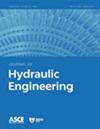低资源环境下估算河流流量的单点流速测量方法的改进
IF 2.8
3区 工程技术
Q2 ENGINEERING, CIVIL
引用次数: 0
摘要
:河流站点准确可靠的河流流量评估是获取的重要信息。这项工作修改了基于幂律(PL)的模型和单点流速测量(SPM)方法来计算河道流量。具体而言,对恒定剪切速度假设、水面效应、潜在速度分布和测量次数提出了修改意见。为了考虑水面对流速分布的影响,提出了水面系数(cw)。此外,还提出了一种功率尾流定律(PWL)方法来处理最大速度出现在水面以下的速度下降现象。介绍了利用实验室和现场数据对改造性能的关键评估。将试错程序应用于实验室数据,以获得所提出的系数cw的值以及PWL速度分布参数α和β。发现cw¼0。3,α¼1。5=m,且β¼0。6是在大多数情况下产生最小误差的最合适的值。将组合方法应用于现场数据,以证明修改的性能和增加测量次数的影响。研究发现,考虑水面效应显著提高了精度。此外,还发现,在大多数测试截面中,使用五个测量的测速点,基于PL和PWL的修正模型可以以合理的精度估计流量。在大多数研究的河流中,五点组合将平均绝对百分比误差(MAPE)值降低到5%以下。DOI:10.1061/JHEND8.HYENG-13469。©2023美国土木工程师学会。本文章由计算机程序翻译,如有差异,请以英文原文为准。
Modifications to the Single Point Velocity Measurement Method for Estimating River Discharge in Low-Resource Environments
: Accurate and reliable river discharge evaluation at a river station is an essential piece of information to obtain. This work modifies a power-law (PL)-based model and a single point velocity measurement (SPM) method for calculating channel discharge. Specifically, modifications are proposed for the constant shear velocity assumption, water surface effects, the underlying velocity distribution, and the number of measurements. A coefficient of water surface ( cw ) is proposed to consider the impact of water surface on distribution of velocity. Additionally, a power-wake-law (PWL) method is proposed to cope with the velocity dip phenomenon, where the maximum velocity occurs below the water surface. A critical assessment of the performance of the modifications using laboratory and field data is introduced. A trial-and-error procedure is applied to the laboratory data to obtain the value of the proposed coefficient cw and the parameters of PWL velocity distribution, α and β . It is found that cw ¼ 0 . 3 , α ¼ 1 . 5 = m, and β ¼ 0 . 6 are the most appropriate values that produce minimum errors in most cases. A combination approach is applied to the field data to demonstrate the performance of the modifications and the impact of increasing the number of measurements. It is found that considering a water surface effect has significantly improved the accuracy. Also, it is found that the modified PL-and PWL-based models can estimate discharge with a reasonable accuracy using five measured velocimetry points in most tested cross-sections. In most studied rivers, the five-point combinations reduce the mean absolute percentage error (MAPE) value to less than 5%. DOI: 10.1061/JHEND8.HYENG-13469. © 2023 American Society of Civil Engineers.
求助全文
通过发布文献求助,成功后即可免费获取论文全文。
去求助
来源期刊

Journal of Hydraulic Engineering
工程技术-工程:机械
CiteScore
5.10
自引率
8.30%
发文量
0
审稿时长
10 months
期刊介绍:
The Journal of Hydraulic Engineering accepts original contributions that describe the analysis and solutions of problems in hydraulic engineering. Technical Notes may present a problem, without solution, of common interest. Topics range from flows in closed conduits to free-surface flows (canals, rivers, lakes, and estuaries) to environmental fluid dynamics. Topics include transport processes involving fluids (multiphase flows) such as sediment and contaminant transport, and heat and gas transfers. Emphasis is placed on the presentation of concepts, methods, techniques, and results that advance knowledge and/or are suitable for general application in the hydraulic engineering profession.
 求助内容:
求助内容: 应助结果提醒方式:
应助结果提醒方式:


